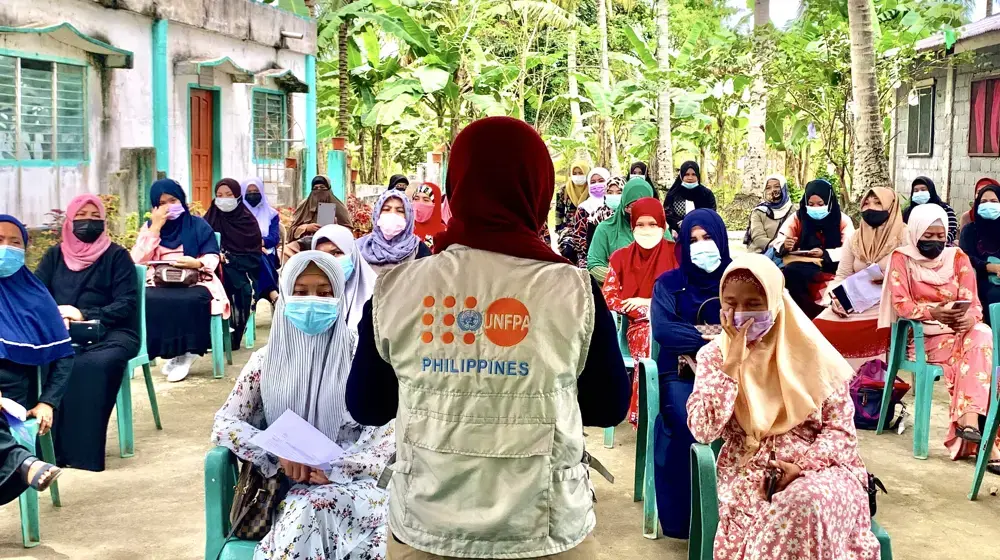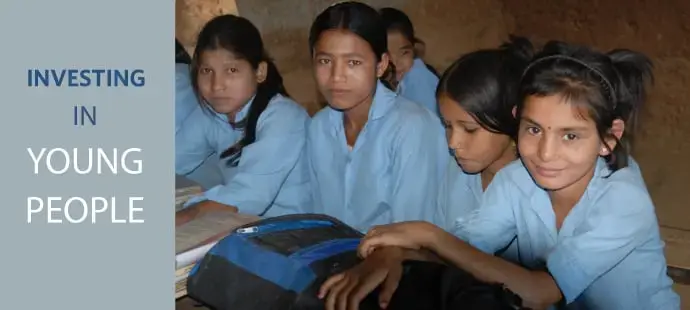Profile: Sittie Rajabia Monato, UNFPA Philippines
“We are working to ensure there is continuity of services, despite armed conflicts, despite disasters and despite COVID-19”
Bangsamoro Autonomous Region in Muslim Mindanao is in the process of transitioning from conflict with a peace agreement between the Moro Islamic Liberation Front and the Government of the Philippines. Sittie Rajabia Monato is the Gender-based Violence (GBV) Working Group Coordinator with UNFPA on the ground.
“I've seen many people displaced and I’ve been displaced myself,” says Sittie. “When I was little I experienced moving from one place to another.”
Sittie’s personal experience of displacement gave her insights into the potential for violations and abuses of human rights. As a provisional government emerged from the peace process in Bangsamoro Autonomous Region in Muslim Mindanao (BARMM), she saw an opportunity to mainstream UNFPA work addressing gender-based violence. “We played a big role in the GBV Working Group coordination. We work very closely with the government.”
Even before the Moro Islamic Liberation Front’s final peace agreement, together with child protection teams, the working group coordinated with community-level partners to collaborate on child and adolescent survivors. “We worked together to develop the referral pathway for GBV survivors during the Marawi Siege because most of them were children during the conflict.”
“We worked together to develop the referral pathway for GBV survivors during the Marawi Siege because most of them were children during the conflict.”
Effective coordination is important in order to save lives. Sittie works closely with the mandated multi-sectoral service providers (health, social services, safety and security and justice) and mainstreams GBV risk mitigation, prevention and response across different sectors, including the recovery and rehabilitation structure of the national government such as the Task Force Bangon Marawi . It puts in place the resources required for response and rehabilitation. “We work with the government counterparts and duty bearers to make sure that all the means are included in a gender-responsive plan budget for addressing gender-based violence in evacuation centers and when people return to their places of origin.”
She says pre-existing gender inequalities in the family and in the community are amplified in disasters when they go to evacuation centers. “The risk of experiencing gender-based violence becomes higher in disasters or displacement.”
“The risk of experiencing gender-based violence becomes higher in disasters or displacement.”
The GBV Working Group looks to ensure and improve access to life-saving services for survivors of gender-based violence. Through coordinated advocacy, they operationalized the women’s and children’s protection unit in the hospital which now has a dedicated doctor, social worker and police representative.
She says tangible services are a priority in providing support for survivors, especially ones in vulnerable conditions. “Many of our displaced populations are still in shelters or transitional housing.”
Sittie says the pandemic has caused difficulties accessing health services like GBV specialized services in the hospitals as the attention and resources were redirected to COVID-19 response.
UNFPA also works at the policy level with the Bangsamoro Women Commission Ministry of Social Services and Development and the Philippine National Police Women and Children Protection Desk in setting up clear guidelines and protocols on how to support GBV survivors. During the lockdown she handled cases where all the referrals and collaboration worked together to deliver support.
She shares the story of a girl who was forcibly married to an older man and referred for assistance. “She experienced domestic violence with her husband. We worked with the Ministry Social Services and Development and the police were able to trace the child and provide immediate life-saving support. In the end the girl was reunited with her mother.”
Cases like this demonstrate the need to work closely with service providers, including the Ministry of Social Services and Development and their counterparts to better coordinate to save the lives of women and girls. Sittie says having this set up and making it functional is key to improving outcomes.
“On top of the conflict we experience disasters like typhoons, earthquakes and floods. We have to have support in place before the disasters.”
She says the Bangsamoro Autonomous Region in Muslim Mindanao continues to experience conflict and displacement, which makes the network of service providers critical in disasters. “On top of the conflict we experience disasters like typhoons, earthquakes and floods. We have to have support in place before the disasters.”
Sittie says survivors can access a reporting tool safely 24 hours a day, even during a cascade of disasters. “One of the things we are working on is ensuring there is continuity of services, despite armed conflicts, despite disasters and despite COVID-19.”
“It is an opportunity for us to introduce the means that we have for gender responsive programs and mobilize resources and leverage partnership to improve the well-being of women and girls in all stages of emergencies and recovery. "
She has seen again and again how displacement exacerbates conditions for gender-based violence and that it affects women and girls disproportionately.
Sittie says setting a strong GBV coordination mechanism and capacity enhancement of protection partners creates an opening for wider discussions. “It is an opportunity for us to introduce the means that we have for gender responsive programs and mobilize resources and leverage partnership to improve the well-being of women and girls in all stages of emergencies and recovery. It’s a chance to advocate and promote gender equality and women's empowerment.”
Learn more
Inter-Agency Minimum Standards for GBV in Emergency Programming
Handbook for Coordinating GBV Interventions in Emergencies
PHOTO: Training former women combatants as parasocial workers. ©UNFPA Philippines





